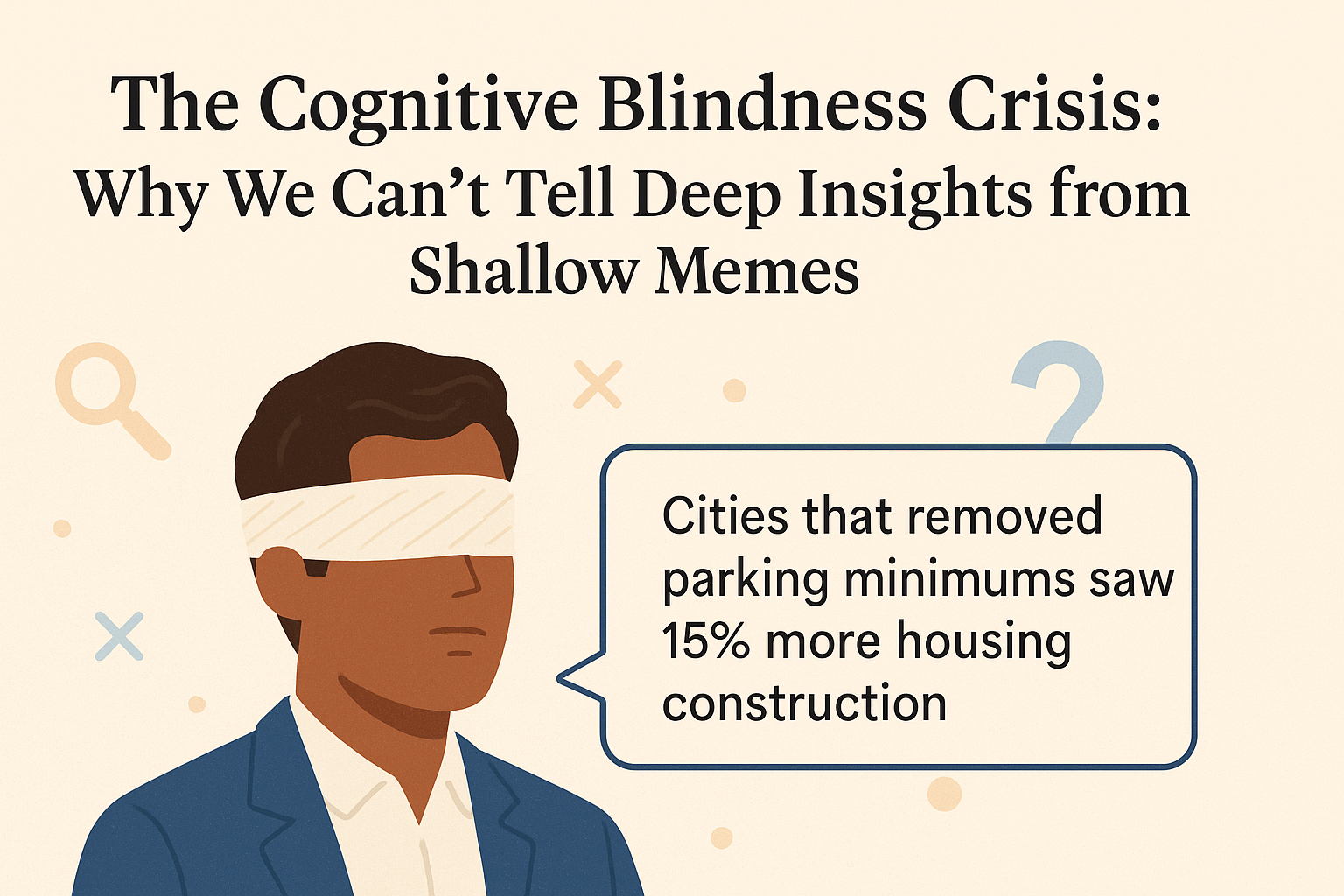The Cognitive Blindness Crisis: Why We Can't Tell Deep Insights from Shallow Memes
We’re drowning in confident claims and starved for context. The moment we read something like “Cities that removed parking minimums saw 15% more housing construction”, our brains start treating it as true—before we’ve even asked where, when, or compared to what. This is cognitive blindness.

You're scrolling through your feed when this pops up: "Cities that removed parking minimums saw 15% more housing construction."
Clean. Confident. Shareable.
But here's what should terrify you: You have no way to know if this claim conceals genuine research or is complete fabrication. And by the time you've read it, your brain has already begun treating it as potentially true.
This is cognitive blindness—our complete inability to assess information depth at the moment of contact. And it's destroying our collective capacity to think clearly about complex problems.
The Moment Everything Goes Wrong
The damage happens in the first three seconds. That's how long it takes your brain to read "Cities with bike lanes see 23% more business revenue" and begin constructing mental models around it. You're already imagining bustling bike-friendly shopping districts before you've even considered asking: What cities? What kind of businesses? Compared to what baseline?
Cognitive scientists call this "truth bias"—our default assumption that information we encounter is probably accurate. This bias evolved when information came from people we knew personally. It's catastrophically mismatched for an environment where any stranger can beam claims directly into our consciousness.
Here's the cruel mathematics: By the time contradicting evidence arrives (if it ever does), you've already formed cognitive commitments that require active effort to undo. The original claim isn't just information anymore—it's become part of how you understand the world.
When Smart People Become Transmission Vectors
Sarah is brilliant. PhD in urban planning, careful thinker, someone whose judgment you trust. When she shares "Remote work killed company culture," you absorb not just the claim but her implicit endorsement of it.
You don't know that Sarah saw this claim in a LinkedIn post, briefly thought "that matches my intuition," and shared it in thirty seconds. You don't know the original "study" was a single survey of 200 employees at tech startups. You don't know the methodology was riddled with confirmation bias.
You just inherited a conclusion without any of the reasoning that should have led to it.
This is how cognitive blindness spreads through networks of intelligent people. We're not sharing information—we're transmitting pre-digested conclusions stripped of the evidence that would let others evaluate them properly.
The Depth Masquerade
Shallow claims are masters of impersonation. They present themselves with the confidence of deep analysis while providing none of the substance. Consider how these differ:
Shallow: "Sweden's crime rate has skyrocketed"
Deep: "Reported sexual assault cases in Sweden increased 58% from 2014-2019, primarily due to 2018 legal reforms that broadened the definition and encouraged reporting, according to the Swedish National Council for Crime Prevention"
Shallow: "Electric vehicles are worse for the environment"
Deep: "Current EV lifecycle carbon emissions are 15-30% lower than gas vehicles in countries with clean grids, but 10-20% higher in coal-dependent regions, according to MIT's 2023 comparative analysis"
The shallow versions spread faster because they're easier to process and remember. They also happen to be almost completely useless for actual decision-making.
Why Fact-Checking Fails
Traditional fact-checking is like trying to recall contaminated food after it's been consumed. The viral velocity of shallow claims far outpaces the methodical speed of verification.
A false claim about vaccine side effects reaches ten million people in the first 24 hours. The careful epidemiological study debunking it publishes six months later and reaches maybe fifty thousand people, most of whom already agreed with its conclusions.
Meanwhile, those ten million people have been making health decisions, voting, and spreading the original claim to their networks. The lie has already done its work.
This isn't a failure of fact-checkers—it's a structural impossibility. You cannot chase misinformation after it spreads. You have to catch it at the moment of contact.
The Local Knowledge Solution
Here's what cognitive blindness prevention actually looks like:
The moment you see: "Crime is up 50% in Portland"
Your trained response: "Compared to when? Which crimes? According to which data source? And do I know anyone who actually lives in Portland?"
The moment you see: "This teaching method improves reading scores"
Your trained response: "What was the control group? How was improvement measured? Do I know any teachers who've tried this?"
This isn't about becoming a skeptic who trusts nothing. It's about preserving appropriate uncertainty until you can access the evidence chain that should inform your conclusion.
Building Cognitive Immune Systems
Every shallow claim you absorb without verification is a small surrender of your intellectual sovereignty. Every unverified statement you share contributes to collective confusion.
But every moment you pause to ask "What context am I missing?" is an act of cognitive self-defense. Every time you respond to a startling claim with "Let me check that with someone who would actually know," you're strengthening your immunity to manipulation.
We need to make verification a reflex, not an afterthought.
This means:
- Personal practice: Developing a five-second pause before accepting any statistical claim
- Network hygiene: Asking trusted sources to explain their reasoning, not just their conclusions
- Local validation: Connecting claims to people with direct experience whenever possible
- Uncertainty comfort: Learning to hold multiple possibilities rather than rushing to false certainty
The Stakes: Our Collective Intelligence
Climate policy, public health responses, economic decisions, social movements—all are shaped by which shallow claims achieve viral dominance rather than which insights have genuine depth.
When our information diet consists primarily of pre-digested conclusions, we lose our capacity for nuanced thinking about complex problems. We become a society that mistakes the confidence of claims for the quality of evidence behind them.
The Choice We Face
Every day, you encounter dozens of claims that could reshape how you understand the world. Most come without the context needed to evaluate them properly.
You can continue absorbing these claims reflexively, building your worldview on foundations you've never examined. Or you can develop the cognitive habits that distinguish reliable insight from confident-sounding noise.
The difference between these choices is the difference between thinking and being manipulated.
In a world of infinite information, the scarcest resource isn't data—it's the ability to assess the depth of what we're consuming. That ability must be trained, practiced, and activated at the exact moment when claim meets consciousness.
Because the alternative is drowning in an ocean of shallow certainties while the deep insights we desperately need remain invisible beneath the surface.
